Support healthy sperm production with male fertility supplements
Male fertility supplements support healthy sperm production and optimal male hormone health. Legacy’s male fertility supplements use high-quality, evidence-based ingredients — no pseudoscience.
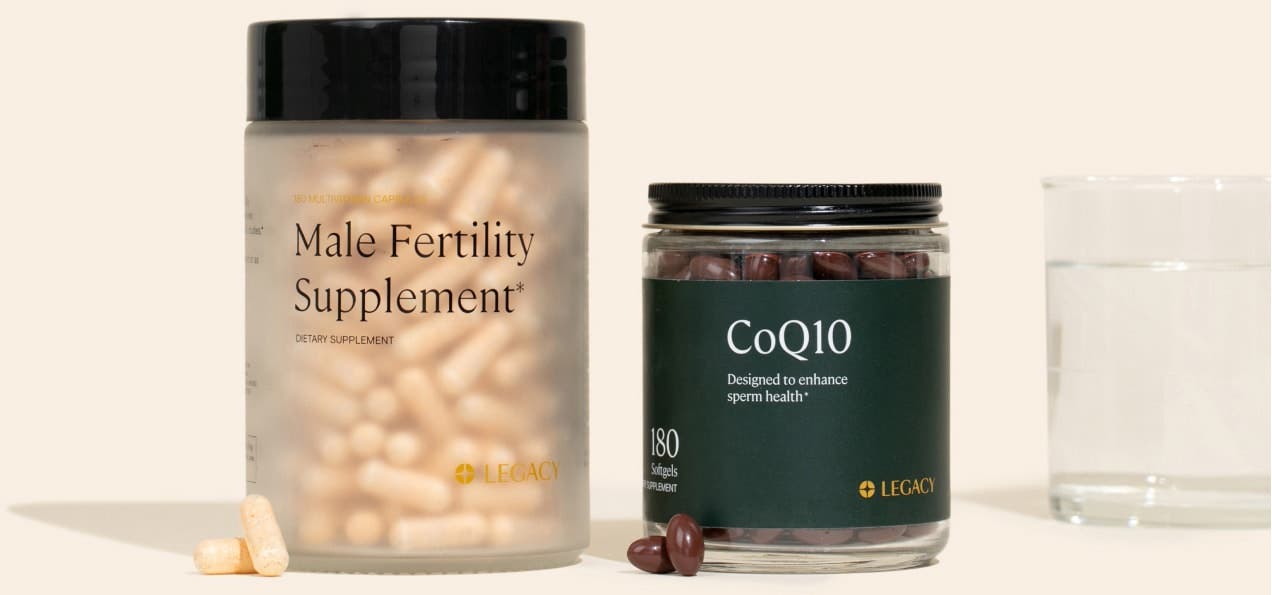
Do you need a male fertility supplement?
Evidence-based male fertility supplements include nutrients that may help:
- Boost poor parameters, such as low sperm count or motility.
- Maintain healthy parameters in the face of damaging forces, like illness, lifestyle habits, and environmental exposure.
Don’t know where your fertility stands right now? Start with a semen analysis.
Sperm count
Sperm motility
Sperm morphology
Sperm DNA fragmentation




How fertility supplements work
Antioxidants
Vitamin D
Zinc
Folate or folic acid

Male Fertility Supplement
10 carefully selected, research-backed active ingredients. No pseudoscience.
Each daily dose contains:
- CoQ10, 300mg
- Vitamin C, 250mg
- Vitamin D, 35mg (1400 IU)
- Vitamin E, 100mg (121 IU)
- Folate (5-MTHF), 1mg DFE
- Zinc, 30mg
- Selenium, 70mcg
- L-carnitine, 200mg
- D-aspartic acid, 50mg
- Lycopene, 5mg
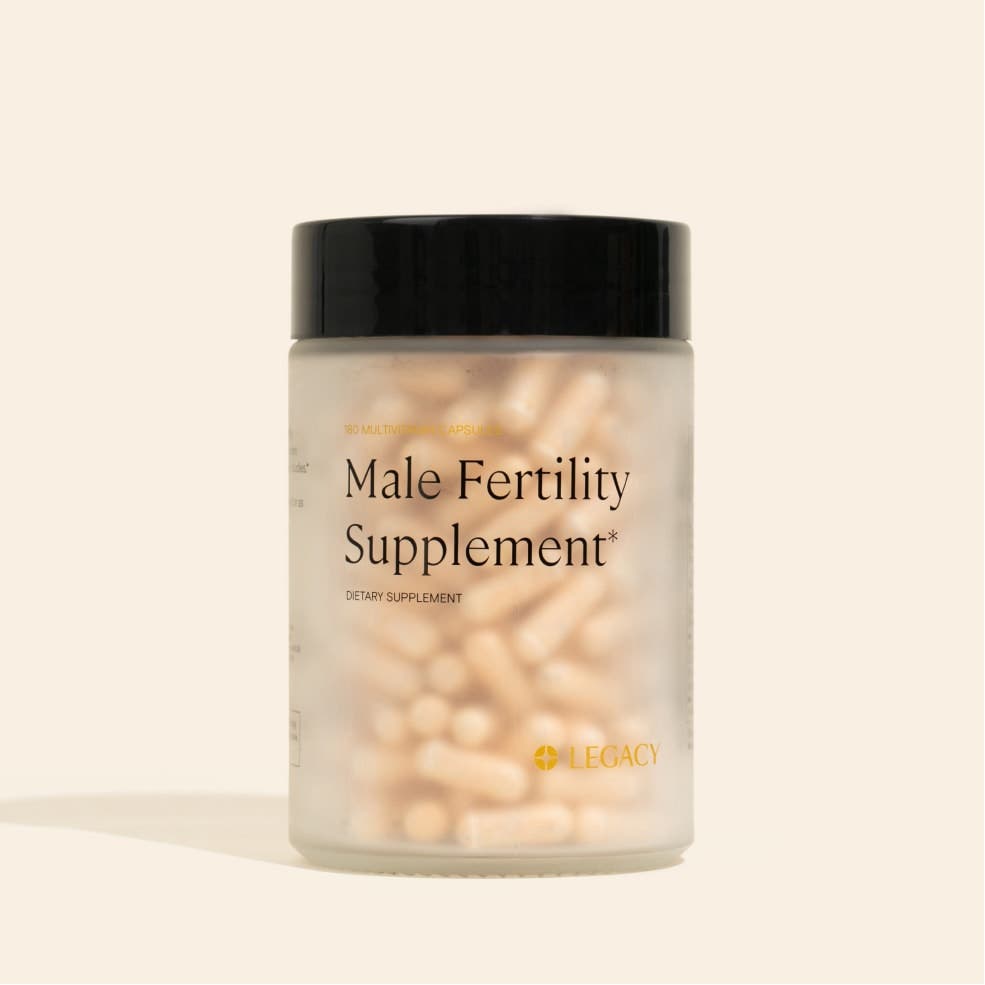
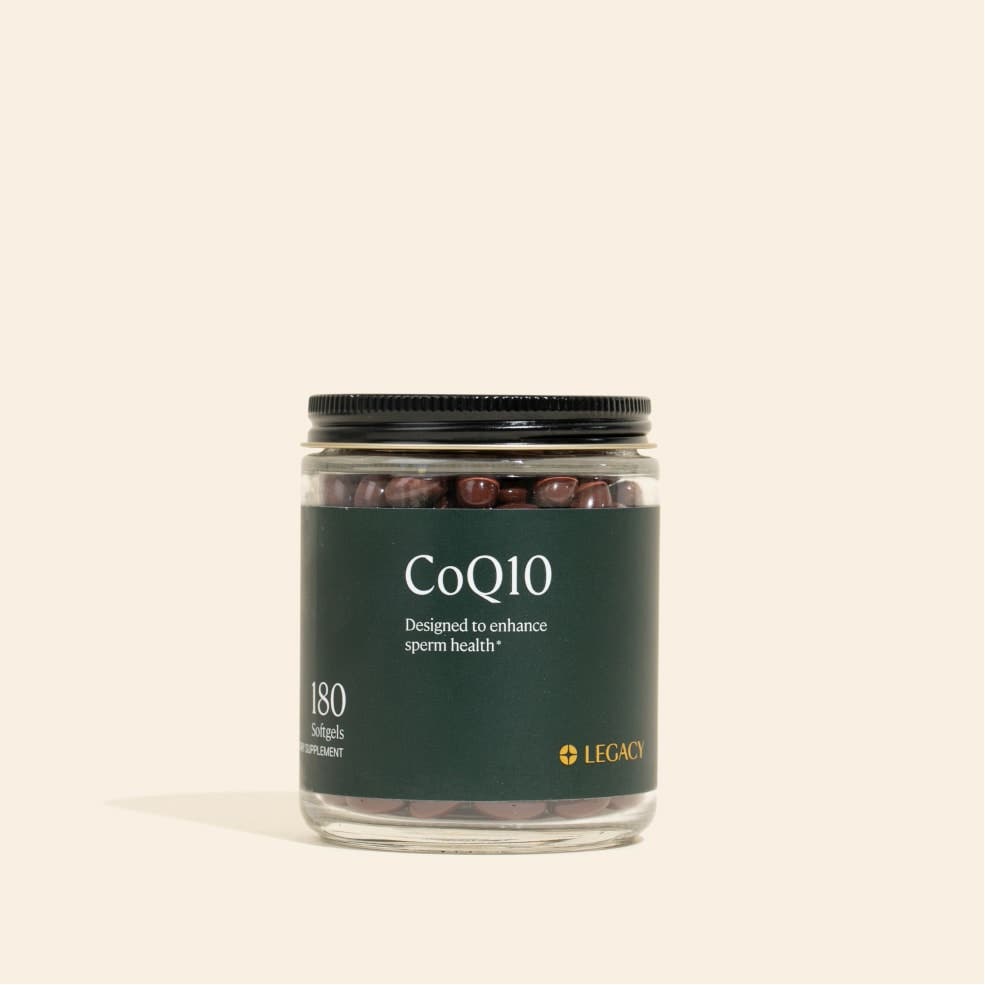
CoQ10 for male fertility
Studies show that supplementation with coenzyme Q10 or “CoQ10,” an antioxidant, may improve sperm concentration, motility, and morphology by protecting sperm from damage.
CoQ10 is the male fertility supplement with the most extensive evidence supporting its use. Clinical trials and meta-analyses have found that CoQ10 may have a “profound” effect on sperm quality after 3–6 months of use.
- Contains ubiquinone, a form of CoQ10 backed by thousands of studies that support its safety and efficacy
- Three-month supply – recommended based on the sperm production cycle (2–3 months)
- Small, easy-to-swallow capsules
- No smell or aftertaste
- Free from common allergens (like gluten, dairy, and soy), sweeteners, and dyes
- Sustainable glass packaging with minimal plastic
- Made in the USA
- Produced at a Good Manufacturing Practice (GMP)-certified and NSF-certified facility
You should take a fertility supplement if:

Which male fertility supplement is right for me?
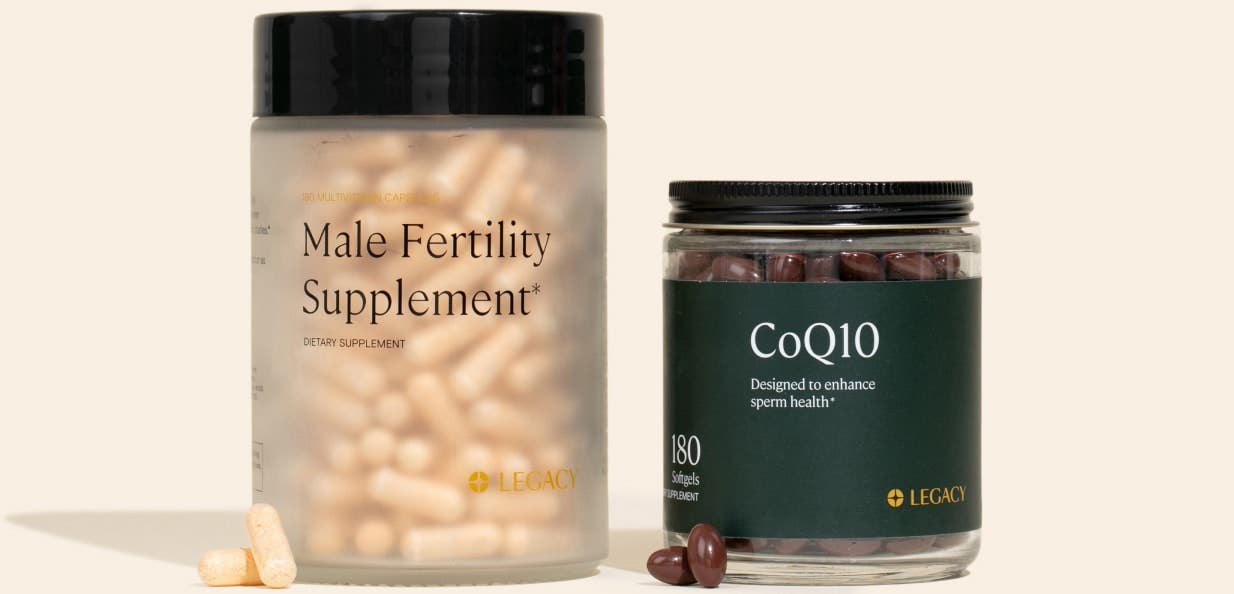
All fertility supplements
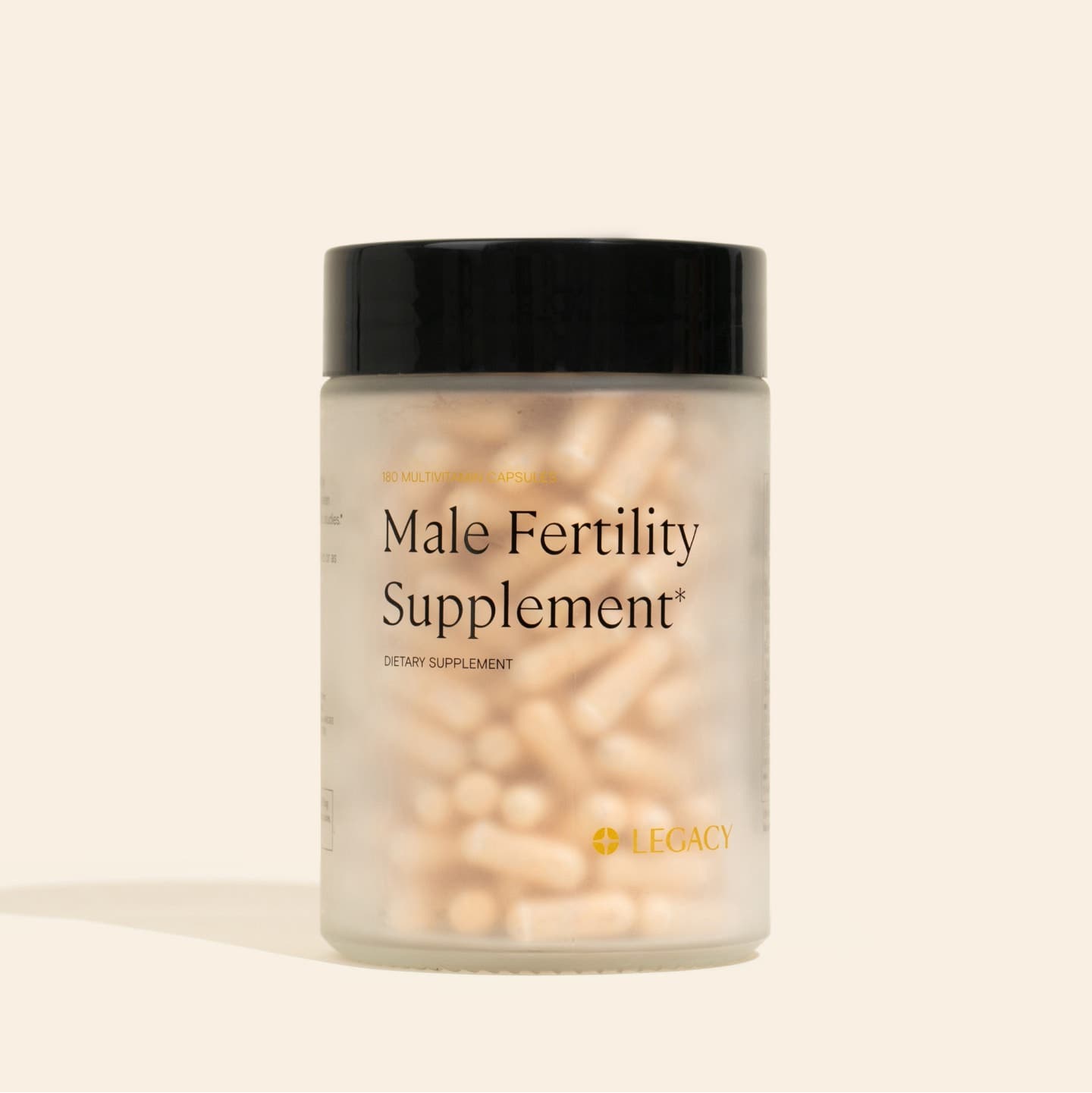
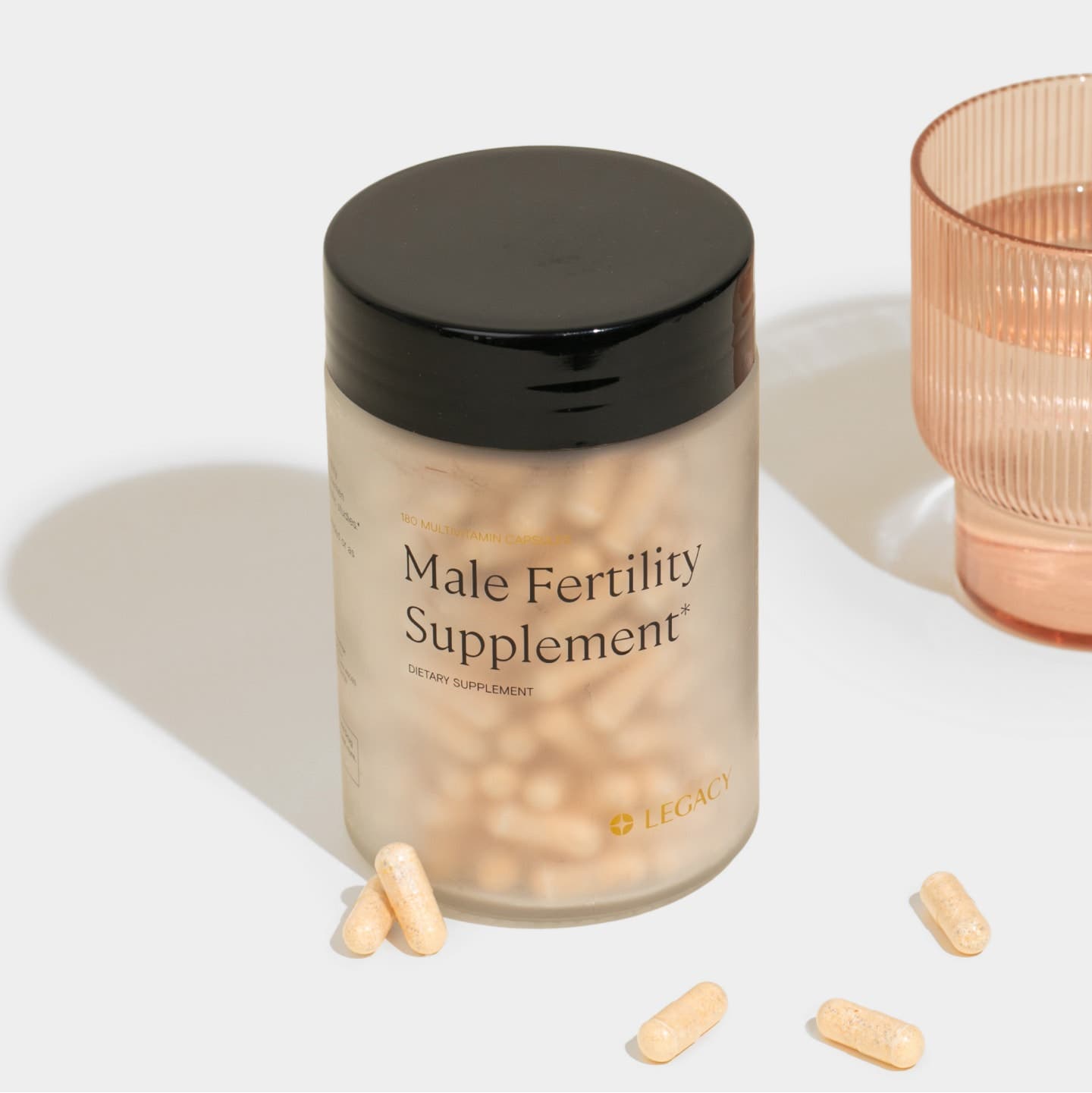
Male Fertility Supplement
- If you’re trying to conceive or planning a family soon
- If you’re undergoing fertility treatment
- If you want to improve sperm before freezing


Male Prenatal Bundle
- If you’re trying to conceive
- If have risk factors for infertility
- If you’re trying to improve sperm health before sperm freezing
Frequently asked questions
A number of vitamins, minerals, antioxidants, and other supplements have been studied for their effects on male fertility and sperm health. Here is an overview of the top male fertility supplements that are best supported by evidence:
- CoQ10. CoQ10 is a strong antioxidant. CoQ10 has a long history of use as a male fertility supplement, with extensive research documenting an increase in sperm concentration. Motility, morphology, and fertilization rates have all been shown to improve after CoQ10 supplementation.
- Vitamin C. A powerful antioxidant, vitamin C may protect sperm from oxidative stress damage. Studies show that vitamin C supplementation is associated with a significant increase — up to 200% — in sperm count, motility, and morphology.
- Vitamin D. Vitamin D male fertility supplementation is associated with improved sperm motility and capacitation (the changes a sperm undergoes before fertilizing an egg), higher testosterone, improved sexual function, and increased pregnancy rates.
- Vitamin E. Vitamin E acts as an antioxidant that can decrease oxidative stress and may have a protective effect on sperm, especially in combination with vitamin C, selenium, and CoQ10. Research shows these antioxidants are associated with improved sperm genetic health and quality.
- Folate/folic acid. Folate, a B vitamin, is used in the production and development of sperm. There is strong scientific evidence that suggests boosting folate levels increases sperm concentration and may improve semen quality overall, especially in combination with selenium, zinc, and vitamin E.
- Zinc. One of the most essential elements for male fertility, zinc is involved in a number of critical reproductive processes, such as spermatogenesis (sperm production) and testosterone release. Zinc male fertility supplementation has been associated with a significant increase in semen volume, sperm motility, and normal sperm morphology, as well as improved hormone health and sexual function.
- Selenium. Selenium is an important trace mineral with antioxidant properties. There’s strong evidence that selenium — alone or in combination with vitamins C and E or folate — improves sperm count, motility, morphology, and genetic health. Selenium supplementation is also associated with increased testosterone levels and decreased levels of MDA, a marker of oxidative stress.
- L-carnitine. L-carnitine is derived from an amino acid and is involved in the production of energy in the body. Supplementation has been shown to improve sperm motility (possibly by supporting mitochondrial function), sperm capacitation, and fertilization rates.
- D-aspartic acid. D-AA is an amino acid that regulates testosterone release. Studies suggest that supplementation with D-AA can increase sperm concentration and motility, as well as pregnancy rates. There’s also some evidence that taking D-AA may boost testosterone and sex drive.
- Lycopene. Lycopene is a potent antioxidant. There’s evidence that adding lycopene to your diet may improve many aspects of male fertility — including sperm count, viability, quality, and genetic health — as well as pregnancy rates. It may also protect against oxidative stress.
Sperm takes about 72 days to produce. That means your current sperm quality is a reflection of your overall health and environment for the past 2–3 months.
Therefore, we recommend starting male fertility multivitamins in advance, keeping in mind that you should see the effects of these vitamins for male fertility after about 3 months.
However, fertility supplements are not a one-size-fits-all solution. If you’re experiencing difficulty conceiving or infertility, the best treatment for you depends on what’s causing the issue.
Testing your sperm is the best way to understand where you are now, and what path you might take to improve your fertility. We offer at-home semen analysis so you can start your fertility journey with clear, comprehensive data.
Fertility supplements work best in tandem with other lifestyle changes to support optimal fertility. Legacy’s semen analysis report comes with personalized lifestyle recommendations. Learn more about improving your sperm health.
CoQ10 is the male fertility supplement with the most extensive evidence supporting its use. Clinical trials and meta-analyses have found that CoQ10 may have a “profound” effect on sperm quality after 3–6 months of use.
CoQ10 may also help improve female fertility. Studies have found that CoQ10 supplementation is associated with increased pregnancy rates for infertile women undergoing fertility treatment.
However, this does not necessarily directly translate to improved conception or pregnancy rates. There’s limited data about the relationship between male fertility vitamins and pregnancy rates. We do know, however, that better semen parameters have been correlated with a higher chance of natural conception and conception via fertility treatments.
Increasing your chances of conceiving will depend on your personal fertility and sexual health as well as your partner’s. Learn more about trying to conceive.
There are many influences — some of which aren’t even in your control — that can affect your fertility health. These influences include age, illness (especially infections and illnesses that include fever), lifestyle habits (such as smoking), and environmental exposure.
CoQ10 and the Male Fertility Supplement contain antioxidants that protect sperm from stress. Therefore, taking these supplements may help maintain your sperm health, even in the face of potentially damaging forces.
The Male Fertility Supplement is best for you if you’re looking for a comprehensive male multivitamin for fertility.
We recommend taking male fertility vitamins for 3–6 months if you’re trying to conceive or looking to improve your sperm health before freezing.
The statements on this page have not been evaluated by the Food and Drug Administration. This product is not intended to diagnose, treat, cure, or prevent any disease.
We recommend talking to your doctor before starting any new supplement regimen.
We recommend consulting your doctor and checking with your benefits coordinator to understand any specific requirements for reimbursement, such as a letter of medical necessity, or limits on usage or protocols. If your purchase is eligible, you can use your HSA/FSA card or submit your itemized receipt — sent to your inbox after purchasing — for reimbursement.